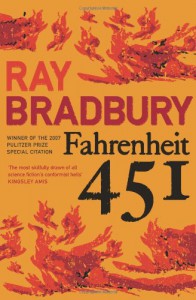Fahrenheit 451 - Ray Bradbury

This is the story of a society gone rotten.
Firemen have turned from life-savers putting out house fires to life-destroyers burning books, which are perceived as too challenging, too good at asking awkward questions about life for people's happiness - which is the highest goal in this world. The happiness of the individual, that is. Children race down highways at four hundred miles an hour, hitting dogs and rabbits and sometimes even other people for the hell of it. People spend their whole lives in the TV parlour, surrounded by TV "families" bickering about nothing in particular. So many people try suicide every night that the doctors have a special machine for pumping the stomach that can be operated by non-medically trained technicians. In the middle of it all, the fireman Guy Montag is having what amounts to a mid-life crisis, wondering what is happening to the world around him, seeking out some truth, some reality in the middle of it all.
I really enjoyed this. It pushes you along, inviting you to read more. The plot is simple and well-paced, and there are some lovely quotes - my favourite being this one of Ripley's, a Catholic executed in Elizabeth's reign:
"We shall this day light such a candle, by God's grace, in England, as I trust shall never be put out."
However, it does occasionally feel like the characters are explaining things to the reader rather than to each other, as when Faber (an old professor) explains to Montag (who must already know) that the trains no longer run. This is unfortunate, since it is the only hint of those other books from the same golden age of science fiction - Asimov, Heinlein, Clarke (who all have other merits, by the way) - which concentrate more on ideas than on style, seeking to convey these ideas to the reader rather than create convincing characters. But in all other respects, Fahrenheit 451 is entirely unlike those other SF novels. It even has metaphors, for goodness' sake, expressive, elegant ones like "it was like coming into the cold marbled room of a mausoleum after the moon had set." (Yes, I know that's technically a simile.) The inner life of Montag is well captured and drawn, and there are some truly chilling predictions in there: the Seashell radios are exactly like iPod headphones; the decline of books can be seen even now in slumping book sales; the terrible, cruel voyeurism of reality television and its manipulation of that reality can be seen in shows like Wife Swap and Supernanny . (Yes, I do watch those occasionally.)
The novel does leave some loose ends. For instance, the fate of Clarisse McClellan, one of the few people left who really pays attention to the world, is never really explained - she disappears early in the book, and although we do hear the rumour of what happened, it always feels as if there is something else to hear, which never materialises. Just solving this question in the introduction feels like cheating.
But, anyway, this book is full of good reasons to keep reading. It is an ode to the power of books to keep people thinking, keep people "aware of the world", and to society's need for books, and the resilience of man.
(Oh, and the significance of the title: 451 Fahrenheit is the temperature at which books burn.)


